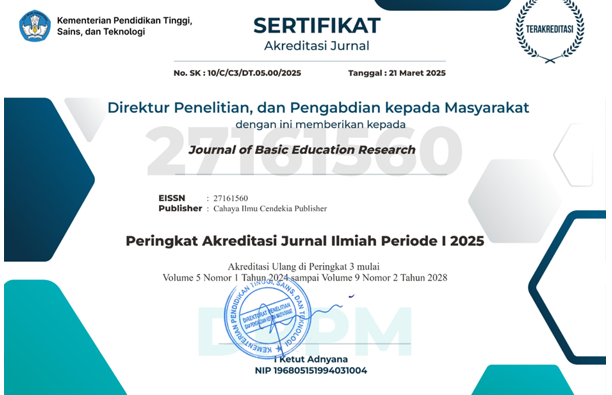Association of Learners Academic Performance with the Preparedness and Competence in the Implementation of Modular Learning Among Secondary School Teachers at Lanao del Norte
Abstract
Purpose of the study: Part of the challenge in the paradigm shift of the Philippine education system during the pandemic is the adoption and implementation of modular learning in pursuit of the continuity of learning and the promotion of learners' academic performance. This study inquired about the secondary school teachers' preparedness and competence in implementing modular learning and its relationship to learners' academic performance.
Methodology: Descriptive correlational approach with triangulation. A stratified sample of secondary school teachers (n = 77) and students (n = 322) was calculated through Raosoft, representing the two national high schools at Lanao del Norte that participated in the researcher-made validated and reliable tool (α = 0.81). Quantitative data were analyzed and yielded mean, frequency, percentage distribution, and Pearson results. Qualitative data were then manually coded, transcribed, and translated.
Main Findings: The secondary school teachers are well-prepared to implement modular learning in printing, segregating, delivering, retrieving, facilitating learning, and feedbacking (WM = 3.72). They are generally competent teachers based on their specialization in monitoring, assessing, and evaluating their students (WM = 3.86), with average academic performance (MS =83.03). The secondary school teachers' preparedness (r = -0.19; p = 0.00) and competence (r = -0.30; p = 0.00) significantly correlate with learners' academic performance.
Novelty/Originality of this Study: This study conveys the situation of teachers' preparedness and competence in implementing modular learning to promote academic performance despite the challenging situations in the COVID-19 pandemic. It contributes to a better understanding of promoting quality education amid a crisis.
References
F. T. Dayagbil, D. R. Palompon, L. L. Garcia, and M. M. J. Olvido, "Teaching and learning continuity amid and beyond the pandemic," in Frontiers in Education, 2021, vol. 6: Frontiers Media SA, p. 678692, doi: https://doi.org/10.3389/feduc.2021.678692.
F. Castroverde and M. Acala, "Modular distance learning modality: Challenges of teachers in teaching amid the Covid-19 pandemic," International Journal of Research Studies in Education, vol. 10, no. 8, pp. 7-15, 2021, doi: https://doi.org/10.5861/ijrse.2021.a007.
M. S. Tugano, J. Z. Tria, and J. Z. Tonio, "Modular learning amidst COVID-19 pandemic: Satisfaction among students in a higher education institution," International Journal of Professional Development, Learners and Learning, vol. 4, no. 2, p. ep2206, 2022, doi: https://doi.org/10.30935/ijpdll/12075.
A. Abude, "The Effectiveness of Modular Distance Learning Modality to the Academic Performance of Students: A Literature Review," Himalayan Journal of Education and Literature, vol. 2, no. 6, pp. 44-46, 2021, doi: https://doi.org/10.3126/hjel.v2i6.37188.
(2020). DO 018, s. 2020: Policy Guidelines for the Provision of Learning Resources in the Implementation of the Basic Education Continuity Plan. . [Online] Available: https://www.deped.gov.ph/wp-content/uploads/2020/04/DO_s2020_018.pdf
J. A. De Villa and F. K. B. Manalo, "Secondary teachers' preparation, challenges, and coping mechanism in the pre-implementation of distance learning in the new normal," IOER International Multidisciplinary Research Journal, vol. 2, no. 3, pp. 144-154, 2020, doi: http://dx.doi.org/10.35942/ioerimr.v2i3.66.
C. Rapanta, L. Botturi, P. Goodyear, L. Guàrdia, and M. Koole, "Online university teaching during and after the Covid-19 crisis: Refocusing teacher presence and learning activity," Postdigital science and education, vol. 2, pp. 923-945, 2020, doi: https://doi.org/10.1007/s42438-020-00155-y.
L. A. Alea, M. F. Fabrea, R. D. A. Roldan, and A. Z. Farooqi, "Teachers' Covid-19 awareness, distance learning education experiences and perceptions towards institutional readiness and challenges," International Journal of Learning, Teaching and Educational Research, vol. 19, no. 6, pp. 127-144, 2020, doi: https://doi.org/10.26803/ijlter.19.6.9.
E. Bustillo and M. Aguilos, "The Challenges of modular learning in the wake of COVID-19: A digital divide in the Philippine countryside revealed," Education Sciences, vol. 12, no. 7, p. 449, 2022, doi: https://doi.org/10.3390/educsci12070449.
D. B. Carreon, "Teachers’ Readiness and Challenges in Modular Distance Learning," Available at SSRN 3944096, 2021, doi: https://doi.org/10.2139/ssrn.3944096.
S. L. Siedlecki, "Understanding descriptive research designs and methods," Clinical Nurse Specialist, vol. 34, no. 1, pp. 8-12, 2020, doi: https://doi.org/10.1097/NUR.0000000000000493.
M. K. Asamoah, "Re-examination of the limitations associated with correlational research," Journal of Educational Research and Reviews, vol. 2, no. 4, pp. 45-52, 2014.
I. Raosoft, "Sample size calculator by Raosoft," Inc, in, 2020.
Y. T. Prasetyo, A. M. Castillo, L. J. Salonga, J. A. Sia, and J. A. Seneta, "Factors affecting perceived effectiveness of COVID-19 prevention measures among Filipinos during enhanced community quarantine in Luzon, Philippines: Integrating Protection Motivation Theory and extended Theory of Planned Behavior," International journal of infectious diseases, vol. 99, pp. 312-323, 2020, doi: https://doi.org/10.1016/j.ijid.2020.07.060.
J. A. Boivin and K. Welby, "Teaching Future Educators during a Global Pandemic," IAFOR Journal of Education, vol. 9, no. 2, pp. 25-36, 2021. [Online]. Available: https://iafor.org/journal/iafor-journal-of-education/volume-9-issue-2/article-2/.
R. Berkowitz, "School matters: The contribution of positive school climate to equal educational opportunities among ethnocultural minority students," Youth & Society, vol. 54, no. 3, pp. 372-396, 2022, doi: https://doi.org/10.1177/0044118X20949047.
H. K. Pangandaman, N. D. Ali, J. H. C. Lambayong, and M. L. G. Ergas, "Philippine higher education vis-à-vis education 4.0: A scoping review," International Journal of Advanced Research and Publications, vol. 3, no. 3, pp. 65-69, 2019.
M. Đurišić and M. Bunijevac, "Parental involvement as a important factor for successful education," Center for Educational Policy Studies Journal, vol. 7, no. 3, pp. 137-153, 2017.
J. Jafarov, "Factors affecting parental involvement in education: The analysis of literature," 2015.
N. A. Aragasi and H. K. Pangandaman, "Coping style, anxiety level, organizational support, and work commitment of educators during the COVID-19 pandemic in the Philippines: A mixed-methods study," Belitung Nursing Journal, vol. 7, no. 4, pp. 267-276, 2021, doi: https://doi.org/10.33546/bnj.1393.
Copyright (c) 2023 Janisa I. Pangandaman, Hamdoni Pangandaman

This work is licensed under a Creative Commons Attribution-NonCommercial 4.0 International License.
Authors who publish with this journal agree to the following terms:
- Authors retain copyright and acknowledge that the Journal of Basic Education Research is the first publisher licensed under a Creative Commons Attribution 4.0 International License.
- Authors are able to enter into separate, additional contractual arrangements for the non-exclusive distribution of the journal's published version of the work (e.g., post it to an institutional repository or publish it in a book), with an acknowledgment of its initial publication in this journal.
- Authors are permitted and encouraged to post their work online (e.g., in institutional repositories or on their website) prior to and during the submission process, as it can lead to productive exchanges and earlier and greater citation of published work.





.png)


.png)
.png)


















